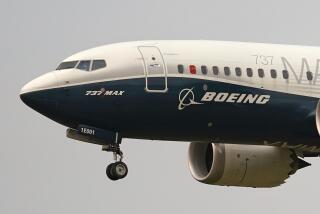Boeing, Lockheed Joining Forces to Launch Rockets
- Share via
Bitter rivals Boeing Co. and Lockheed Martin Corp., faced with a prolonged slump in rocket launches, surprised the aerospace industry Monday by announcing a joint venture in military rockets.
The nation’s two largest defense contractors also agreed to dismiss legal claims against each other over the multibillion-dollar rocket business.
For the record:
12:00 a.m. May 6, 2005 For The Record
Los Angeles Times Friday May 06, 2005 Home Edition Main News Part A Page 2 News Desk 1 inches; 56 words Type of Material: Correction
Rocket venture -- A photo caption with an article in Tuesday’s Business section about a joint venture between Boeing Co. and Lockheed Martin Corp. said the photo showed the maiden launch of the Delta 4 rocket. In fact, the rocket shown was a Delta 4 Heavy. Other versions of the Delta 4 had been launched previously.
The unusual pact calls for Boeing’s Delta 4 and Lockheed’s Atlas 5 rockets to be produced under one roof, and the joint venture would become the primary provider of rocket launches for the Air Force, NASA and other government agencies.
The move, which requires government approvals, came two months after the Air Force lifted a 20-month ban prohibiting Boeing from bidding on satellite launch contracts after allegations that its employees had stolen rocket information from Lockheed.
Both firms are “ready to move forward with a clean slate and an undistracted focus on mission success,” said Lockheed Chief Executive Robert J. Stevens.
Bethesda, Md.-based Lockheed and Chicago-based Boeing were facing a sharp decline in demand for launching satellites into orbit. Worldwide, rocket launches declined from 84 in 1995 to barely 50 last year, in part because of a slowdown in demand by the telecommunications industry.
The Air Force also has required fewer launches because several advanced military satellite projects have encountered delays or cost overruns.
This year the companies were anticipating only three or four total launches of their rockets.
“There was simply not enough demand to keep the companies going on their own,” said Loren Thompson, a defense analyst for the Lexington Institute. “It would have required endless government subsidies.”
The combination could result in a savings of $150 million to the U.S. government, Boeing and Lockheed said.
The new venture will have about 3,800 employees: 2,300 at Boeing’s Delta program and 1,500 at Lockheed’s Atlas. All Delta engineering work, most of which is performed in Huntington Beach and Decatur, Ala., will be shifted to Denver, where Lockheed’s Atlas engineering staff is. The joint venture will be headquartered in Denver.
Consolidating the two operations is expected to cut an unknown number of jobs, Boeing said. In recent years Boeing has steadily shrunk the Delta workforce in Huntington Beach; many workers have moved to Houston or Decatur, where the rockets are assembled.
The joint venture would also culminate a decades-long effort by the Pentagon to build a cheaper rocket.
Since the late 1980s, the military had been relying on the expensive Lockheed Titan 4 rockets to launch its more-sophisticated satellites. The rocket was costing the U.S. as much as $400 million per mission. In the early 1990s, the Air Force asked contractors to develop a new vehicle, dubbed the evolved expendable launch vehicle, or EELV. The goal was to slash costs by more than half and cut the time to prepare for launch.
Both companies believed that they could use demand from the commercial market to provide the military rockets at reduced prices. But the boom never materialized, and the government faced pouring hundreds of millions of dollars to keep both rocket businesses alive.
Boeing shares fell 14 cents to $59.38 and Lockheed shares rose 91 cents to $61.86, both on the New York Stock Exchange.
More to Read
Inside the business of entertainment
The Wide Shot brings you news, analysis and insights on everything from streaming wars to production — and what it all means for the future.
You may occasionally receive promotional content from the Los Angeles Times.










